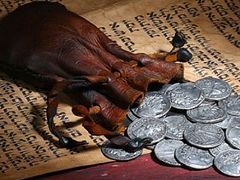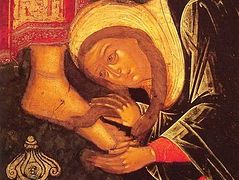In the name of the Father, and of the Son, and of the Holy Spirit!
Today, on Holy and Great Wednesday, we recall two events described in the Gospel. These are the anointing of the Lord with myrrh by the woman who led a sinful life, and the betrayal of Judas. These two episodes are often contrasted in liturgical texts. On the one hand, here is a former sinner who repented; on the other hand, here is a disciple who betrayed the Savior.
 Judas’ Kiss. Giotto. 1303–1305. A fragment of a fresco at the Scrovegni Chapel in Padua (Italy)
Judas’ Kiss. Giotto. 1303–1305. A fragment of a fresco at the Scrovegni Chapel in Padua (Italy)
The personality of Judas has always attracted the special attention of Orthodox theologians, various thinkers, philosophers, and artists. Indeed, how did it happen that the Lord chose a man as His disciple though He knew perfectly well that that man would betray Him? Or why did this man, who obsessed with the passion of love of money had betrayed Christ, then felt remorse, threw away the thirty pieces of silver, and hung himself, unable to bear the terrible pangs of conscience? These are all questions that are not so easy to answer.
Over 2,000 years, theologians, artists, and others have answered these questions in different ways… There have even been absolutely horrible, almost insane thoughts about this, yet there have also been very sober and wise arguments. Anyway, the story of Judas gives us all a very important lesson to learn.
Throughout the Gospel narrative, we see that Judas especially loved money and was enslaved by the passion of love of money. The Lord noticed this and knew that Judas stole funds from the money-box (of which he was in charge) where donations were stored, knew about the sinful passion of His disciple, but at the same time He was patient and waited for Judas to reform. But just the opposite happened: Judas became more and more engrossed in his passion, and as a result of this vice, which may seem “insignificant” and “petty” (one can argue that “many people love money”) Judas was led to stealing, then to betraying Christ Himself, and eventually, to suicide. And this shows us how dangerous each passion is, even a seemingly petty one, and what terrible consequences it can have.
 The Betrayal of Judas. Fragment of a seventeenth century fresco
The Betrayal of Judas. Fragment of a seventeenth century fresco
If we open Patristic works, which describe various sins and passions, we can see that the Holy Fathers described every sin as the worst, the greatest, most terrible sin in the world, and that you cannot be saved if you are obsessed by this vice. It was said about pride, love of money, judging, gluttony, envy, and so on. Whatever sin you take, it is called the most destructive. And that is absolutely true, because the most dangerous sin is the one that we have neglected, about which we thought, “Well, never mind! There’s nothing so bad about it.” Any such sin can ultimately grow into a violent passion and destroy us. That is in fact what happened to Judas.
Of course, it is very important for us to examine our lives thoroughly: Are there any sins that we, God forbid, have totally neglected? It is extremely difficult to rid ourselves of all passions completely, and if we do succeed in this, it will not happen immediately. But the most important thing is to move in this direction so that there can be no sin (not even a petty one) in our lives about which we would say, “It’s nothing to worry about!” Today we see very clearly what consequences this can lead to, as was the case with the Apostle Judas.
Let us take heed concerning this. Let us ask God to help us see our sins, as we have read today (for the last time this year) in the Prayer of St. Ephraim the Syrian, that these sins might be obvious to us, that we might strive to war against them as much as we can without neglecting them, and that they will not destroy us or deprive us of the Heavenly Kingdom. Amen.



